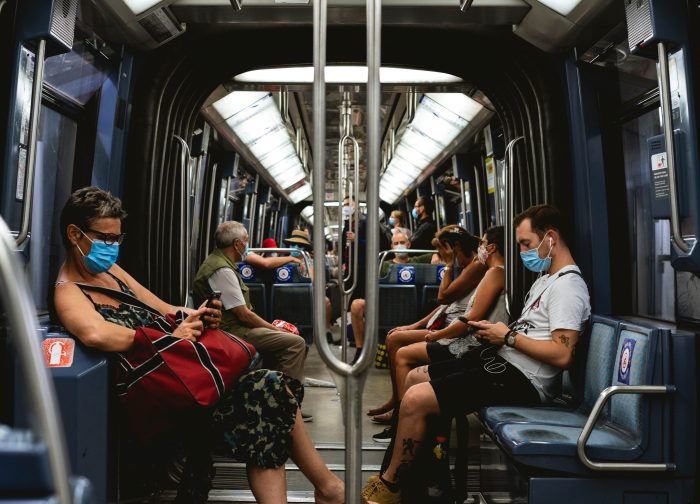Author’s note: This information has been compiled in collaboration with medical doctors and is based on scientific research. It may be incomplete or outdated by the time of publication. The information can be seen as a recommendation but cannot replace medical advice. In case of doubt, please contact your doctor or health office.
“My lady dog just farted in the subway. Suddenly, everyone can pull their f*cking masks over their nose. She’s the hero of the day!” said a Twitter post, which made me laugh out loud.
I’m not sure what it’s like in your country right now, but in Germany, there are some people who actually deny the existence of COVID-19 and therefore, reject wearing their masks properly in public areas despite strict rules.
It’s not only ignorant to disregard scientific facts for one’s own opinion—it’s also disrespectful to put one’s desire for “comfort and freedom” above other people’s health.
At the end of the article, you will know how your dog’s fart can help protect yourself and others. But first, let’s talk about body odor.
Let’s assume you ate a lot of onions for dinner. By the next day, you will realize how this vegetable deeply affects your body:
>> With every breath you exhale, you also exhale proof of that meal, for everyone around you to notice. The more you speak, the more they can smell it.
>> You go to the gym or to the sauna to sweat it all out—your workout neighbours will likely recognize the food you ate, either from your stinky clothes or the sweat pouring from your body.
>> As onions are known for bloating, you may now also have a higher tendency to fart. And even though you may do it as silently as possible, your workmate will throw a disgusted look at you because it stinks throughout the whole room.
Why can someone on the other side of the room smell your fart? How can someone else smell your sweat or your breath? The answer is “aerosols.” These are nanometer-sized, finely dispersed solid or liquid particles suspended in the air. They are constantly changing (for example, when water condenses) and can act as a means of transport for other particles.
When the concentration of aerosols is high, they can be seen with the naked eye (as cigarette smoke, exhaust fumes, or smog). Everyone shares these aerosols with their surrounding, either by breathing, sweating, or farting—and they can stay in the air for hours. These aerosols act as a carrier for the gas that smells like the onions you had eaten.
Why am I telling you all this? Let’s imagine you hadn’t eaten a lot of onions but had become infected with COVID-19, maybe without even knowing it. So you carry the virus within your body. With every breath you exhale, with every evaporation through your skin, with every fart, you can be spreading the virus that is being carried by aerosols.
What does this mean? Simply keeping some distance from others is not enough to avoid the risk of transmission. Simply wearing a mask isn’t either. When spending time indoors with other people, aerosols could have spread throughout the whole room. If a person is a carrier of COVID-19, it means that all other people in the room bear the risk of getting infected.
That doesn’t mean for you to panic, overreact, or to not meet any other person anymore. We’ve had enough “social distancing” to know that this isn’t healthy for our psyches over the long run. But it means to be aware of the ways of transmission and to protect yourself and others as best as possible with the means available.
The goal should be to wear a mask, keep a distance of two meters, regularly ventilate the room properly, and to spend as little time as possible with other people in the same room. Rather, meet your friends for a walk in nature, while (of course) still wearing a mask and keeping physically distant.
Using another stinky food example to understand things better: the Swiss cheese model explains that multiple interventions combined decrease the risk of an infection, compared to one single measure taken.
But let’s get back to the onions. You may be aware that “wet farts” can stick in your pants for quite some time. This is due to larger particles, called droplets. Unlike aerosols, the droplets released while speaking are much larger and fall down to the ground (or any other surface) within seconds. When these droplets carry the virus, they can stick to the surface and survive there for quite some time.
So make sure to use disinfectant on your hands regularly. In order to prevent droplets or aerosols from directly entering your eyes, it is recommended to wear (fake) glasses and to clean them with liquid soap when getting home. Refrain from touching your eyes, nose, mouth, or wounds with your hands if they are not freshly disinfected, and do not scratch your skin.
If the virus got caught in your clothing, you may take it home with you. So, whenever you were in a public space or met with other people, make sure to take off your shoes outside of your home and let them air out for a day.
Also, it’s best to even take off your clothes in the hallway and let them air out (or directly put them into the laundry box) before entering your living room. Do not sit on your bed with your outdoor clothes. It’s recommended to even wipe off your mobile phone with disinfectant when getting home. As your hair can easily catch the virus as well, make sure you have showered and washed your hair before going to bed.
You can act as a role model for others: by sticking to the rules, which are not meant to control anyone, but to save lives. If you ever meet someone who is denying that masks and distance can help contain the spread of COVID-19, you may tell the person about aerosols and the example with the onions.
If still sceptical, you may also show vividly how aerosols work: by using a stink bomb, let your dog fart (or yourself by constantly binge-eating kidney beans, savoy cabbage, and lots of onions), and be assured the other will understand.
If you can easily smell this fart, you’re not standing far enough apart, so wear your f*cking mask.
Stay safe and please help spread the word (while wearing a mask, of course).
~









Read 8 comments and reply